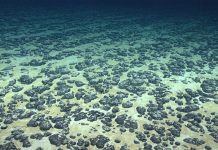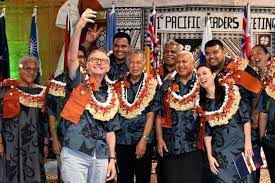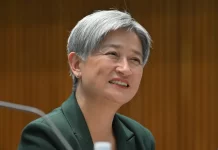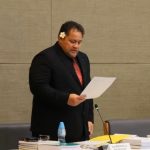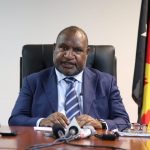Pacific leaders have welcomed Australia’s “renewed commitment” on climate change and interest in co-hosting a United Nations climate summit with Pacific nations, as Anthony Albanese heralds a successful reset of relationships in the region.
At the close of the Pacific Islands Forum in Suva last Thursday, leaders emerged on time and smiling from their daylong leaders’ retreat, before cutting a cake with a ceremonial sword and posing for a selfie when Albanese pulled out his phone.
The retreat was the final and most important event of the forum, the most significant diplomatic meeting in the region. This is the first time that Pacific leaders have been able to meet in person since they gathered in Tuvalu in 2019.
A source present during the retreat said that it was “the most cordial and friendly PIF I have ever attended” and that discussions among leaders “never felt even slightly confrontational”.
This was in contrast to the 2019 meeting, at which the retreat lasted nearly 12 hours, broke down twice and reduced one Pacific leader to tears, over Australia’s attempts to water down language on climate change.
Albanese drew a comparison with the last Forum, which occurred when Scott Morrison was prime minister, and said this year’s event represented a “success” for Australia.
“I note that previously this meeting would have still been going for many hours, and I’m told that one of the reasons for that is the changed position of Australia,” he said.
“On the communique we dealt with that pretty expeditiously today … That represents a success.”
Climate change was central in the communique, with leaders reiterating that it “remains the single greatest existential threat facing the Blue Pacific” and declaring a “climate emergency”.
Australia was also singled out in the document, as Pacific leaders said they “welcomed and fully supported Australia’s renewed commitment to the Forum’s climate change priorities [and] also welcomed the interest from Australia to host a United Nations Framework Convention on Climate Change – Conference of Parties in partnership with Pacific Island countries.”
One thing that was absent from the communique was any reference to coal power. Pacific countries have asserted for years that any chance of keeping global heating to below 1.5C meant a rapid transition away from coal power and no new coal projects.
After the retreat, Albanese was asked what justification he would offer to Pacific nations for keeping new coal and gas projects on the table, which he refused to answer, saying it was hypothetical given it was not something that Pacific countries had raised with him.
“I was not asked about that,” he said. “Not one person today raised such questions in the meeting, nor was it raised in any of the meetings I held.”
Fiji’s prime minister Frank Bainimarama told journalists that his country’s “ask” of Australia was to end its “fossil fuel addiction, including coal”.
“Throughout every meeting and discussion I’ve held this week, I have been clear and consistent in our asks for more ambitious climate commitments. We simply cannot settle for anything less than the survival of every Pacific Island country,” he said.
“Most urgently, it requires that we end our fossil fuel addiction, including coal. That is our ask of Australia. That is our ask of New Zealand, the USA, India, the European Union, China and every other high-emitting country”.
Albanese also defended his government’s target of reducing greenhouse emissions by 43%, which one former Pacific leader has condemned as “far from adequate”.
“The truth is that we went to the election campaign with an ambitious but achievable target of 43% by 2030, with a fully costed plan,” said Albanese.
“And if you ask someone, ‘do you want a higher number?’ in absence of how you get there, then of course people who care about climate change would want action to be as soon as possible. But what you’ve got to do is to have a real plan with a real timetable.”
Dr Wesley Morgan, senior researcher at the Climate Council, and Pacific climate diplomacy expert, said that while Pacific leaders had welcomed new ambition from Australia on climate action, “the elephant in this communique is that even with improved targets, Australia is still not aligned with limiting warming to 1.5 degrees”.
“As a member of the Pacific family – that also happens to be its biggest polluter – Australia should be doing more. That means deeper cuts to emissions this decade, and an end to both approving and funding new fossil fuel projects.”
Bainimarama also discussed the issue of Kiribati’s withdrawal from the Pacific Islands Forum, which has hung over the event, revealing he had spoken to Kiribati president Taneti Maamau on the phone during the retreat.
Bainimarama said he had committed to work with Kiribati to find a resolution to the impasse and that the Forum would “spare no efforts in this regard”.
SOURCE: THE GUARDIAN/PACNEWS




